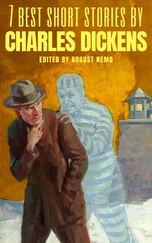Charles Dickens - Short Stories
Здесь есть возможность читать онлайн «Charles Dickens - Short Stories» весь текст электронной книги совершенно бесплатно (целиком полную версию без сокращений). В некоторых случаях можно слушать аудио, скачать через торрент в формате fb2 и присутствует краткое содержание. Жанр: Классическая проза, на английском языке. Описание произведения, (предисловие) а так же отзывы посетителей доступны на портале библиотеки ЛибКат.
- Название:Short Stories
- Автор:
- Жанр:
- Год:неизвестен
- ISBN:нет данных
- Рейтинг книги:4 / 5. Голосов: 1
-
Избранное:Добавить в избранное
- Отзывы:
-
Ваша оценка:
- 80
- 1
- 2
- 3
- 4
- 5
Short Stories: краткое содержание, описание и аннотация
Предлагаем к чтению аннотацию, описание, краткое содержание или предисловие (зависит от того, что написал сам автор книги «Short Stories»). Если вы не нашли необходимую информацию о книге — напишите в комментариях, мы постараемся отыскать её.
Short Stories — читать онлайн бесплатно полную книгу (весь текст) целиком
Ниже представлен текст книги, разбитый по страницам. Система сохранения места последней прочитанной страницы, позволяет с удобством читать онлайн бесплатно книгу «Short Stories», без необходимости каждый раз заново искать на чём Вы остановились. Поставьте закладку, и сможете в любой момент перейти на страницу, на которой закончили чтение.
Интервал:
Закладка:
We were now going in and out, with little noise and great nicety, among the tiers of shipping, whose many hulls, lying close together, rose out of the water like black streets. Here and there, a Scotch, an Irish, or a foreign steamer, getting up her steam as the tide made, looked, with her great chimney and high sides, like a quiet factory among the common buildings. Now, the streets opened into clearer spaces, now contracted into alleys; but the tiers were so like houses, in the dark, that I could almost have believed myself in the narrower bye-ways of Venice. Everything was wonderfully still; for, it wanted full three hours of flood, and nothing seemed awake but a dog here and there.
So we took no Tier-rangers captive, nor any Lumpers, nor Truckers, nor Dredgermen, nor other evil-disposed person or persons; but went ashore at Wapping, where the old Thames Police office is now a station-house, and where the old Court, with its cabin windows looking on the river, is a quaint charge room: with nothing worse in it usually than a stuffed cat in a glass case, and a portrait, pleasant to behold, of a rare old Thames Police officer, Mr. Superintendent Evans, now succeeded by his son. We looked over the charge books, admirably kept, and found the prevention so good that there were not five hundred entries (including drunken and disorderly) in a whole year. Then, we looked into the store-room; where there was an oakum smell, and a nautical seasoning of dreadnought clothing, rope yarn, boat-hooks, sculls and oars, spare stretchers, rudders, pistols, cutlasses, and the like. Then, into the cell, aired high up in the wooden wall through an opening like a kitchen plate-rack: wherein there was a drunken man, not at all warm, and very wishful to know if it were morning yet. Then, into a better sort of watch and ward room, where there was a squadron of stone bottles drawn up, ready to be filled with hot water and applied to any unfortunate creature who might be brought in apparently drowned. Finally, we shook hands with our worthy friend Pea, and ran all the way to Tower Hill, under strong Police suspicion occasionally, before we got warm.
WORKHOUSE
A Walk in a Workhouse
ON a certain Sunday, I formed one of the congregation assembled in the chapel of a large metropolitan Workhouse. With the exception of the clergyman and clerk, and a very few officials, there were none but paupers present. The children sat in the galleries; the women in the body of the chapel, and in one of the side aisles; the men in the remaining aisle. The service was decorously performed, though the sermon might have been much better adapted to the comprehension and to the circumstances of the hearers. The usual supplications were offered, with more than the usual significancy in such a place, for the fatherless children and widows, for all sick persons and young children, for all that were desolate and oppressed, for the comforting and helping of the weak-hearted, for the raising-up of them that had fallen; for all that were in danger, necessity, and tribulation. The prayers of the congregation were desired 'for several persons in the various wards dangerously ill;' and others who were recovering returned their thanks to Heaven.
Among this congregation, were some evil-looking young women, and beetle-browed young men; but not many – perhaps that kind of characters kept away. Generally, the faces (those of the children excepted) were depressed and subdued, and wanted colour. Aged people were there, in every variety. Mumbling, blear-eyed, spectacled, stupid, deaf, lame; vacantly winking in the gleams of sun that now and then crept in through the open doors, from the paved yard; shading their listening ears, or blinking eyes, with their withered hands; poring over their books, leering at nothing, going to sleep, crouching and drooping in corners. There were weird old women, all skeleton within, all bonnet and cloak without, continually wiping their eyes with dirty dusters of pocket– handkerchiefs; and there were ugly old crones, both male and female, with a ghastly kind of contentment upon them which was not at all comforting to see. Upon the whole, it was the dragon, Pauperism, in a very weak and impotent condition; toothless, fangless, drawing his breath heavily enough, and hardly worth chaining up.
When the service was over, I walked with the humane and conscientious gentleman whose duty it was to take that walk, that Sunday morning, through the little world of poverty enclosed within the workhouse walls. It was inhabited by a population of some fifteen hundred or two thousand paupers, ranging from the infant newly born or not yet come into the pauper world, to the old man dying on his bed.
In a room opening from a squalid yard, where a number of listless women were lounging to and fro, trying to get warm in the ineffectual sunshine of the tardy May morning – in the 'Itch Ward,' not to compromise the truth – a woman such as HOGARTH has often drawn, was hurriedly getting on her gown before a dusty fire. She was the nurse, or wardswoman, of that insalubrious department – herself a pauper – flabby, raw-boned, untidy – unpromising and coarse of aspect as need be. But, on being spoken to about the patients whom she had in charge, she turned round, with her shabby gown half on, half off, and fell a crying with all her might. Not for show, not querulously, not in any mawkish sentiment, but in the deep grief and affliction of her heart; turning away her dishevelled head: sobbing most bitterly, wringing her hands, and letting fall abundance of great tears, that choked her utterance. What was the matter with the nurse of the itch-ward? Oh, 'the dropped child' was dead! Oh, the child that was found in the street, and she had brought up ever since, had died an hour ago, and see where the little creature lay, beneath this cloth! The dear, the pretty dear!
The dropped child seemed too small and poor a thing for Death to be in earnest with, but Death had taken it; and already its diminutive form was neatly washed, composed, and stretched as if in sleep upon a box. I thought I heard a voice from Heaven saying, It shall be well for thee, O nurse of the itch-ward, when some less gentle pauper does those offices to thy cold form, that such as the dropped child are the angels who behold my Father's face!
In another room, were several ugly old women crouching, witch-like, round a hearth, and chattering and nodding, after the manner of the monkeys. 'All well here? And enough to eat?' A general chattering and chuckling; at last an answer from a volunteer. 'Oh yes, gentleman! Bless you, gentleman! Lord bless the Parish of St. So-and-So! It feed the hungry, sir, and give drink to the thusty, and it warm them which is cold, so it do, and good luck to the parish of St. So-and-So, and thankee, gentleman!' Elsewhere, a party of pauper nurses were at dinner. 'How do YOU get on?' 'Oh pretty well, sir! We works hard, and we lives hard – like the sodgers!'
In another room, a kind of purgatory or place of transition, six or eight noisy madwomen were gathered together, under the superintendence of one sane attendant. Among them was a girl of two or three and twenty, very prettily dressed, of most respectable appearance and good manners, who had been brought in from the house where she had lived as domestic servant (having, I suppose, no friends), on account of being subject to epileptic fits, and requiring to be removed under the influence of a very bad one. She was by no means of the same stuff, or the same breeding, or the same experience, or in the same state of mind, as those by whom she was surrounded; and she pathetically complained that the daily association and the nightly noise made her worse, and was driving her mad – which was perfectly evident. The case was noted for inquiry and redress, but she said she had already been there for some weeks.
Читать дальшеИнтервал:
Закладка:
Похожие книги на «Short Stories»
Представляем Вашему вниманию похожие книги на «Short Stories» списком для выбора. Мы отобрали схожую по названию и смыслу литературу в надежде предоставить читателям больше вариантов отыскать новые, интересные, ещё непрочитанные произведения.
Обсуждение, отзывы о книге «Short Stories» и просто собственные мнения читателей. Оставьте ваши комментарии, напишите, что Вы думаете о произведении, его смысле или главных героях. Укажите что конкретно понравилось, а что нет, и почему Вы так считаете.










